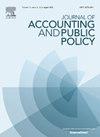团队共识与包容氛围对初级审核员符合性与风险评估分担的影响
IF 2.2
3区 管理学
Q1 BUSINESS, FINANCE
引用次数: 0
摘要
在分层结构的审计团队中,通常由初级审计员进行实地工作并收集大部分审计证据,这使得信息共享至关重要。然而,如果团队共识已经存在,个别审核员可能会服从团队,并且在提出他们自己获得的关于客户的潜在重要问题时犹豫不决。本研究通过实验探讨了团队共识的起源(即初级成员的共识vs.高级成员的共识)和包容性氛围的类型(即真实性vs.归属感)如何影响初级审计师的一致性以及他们与团队分享自己的风险评估的舒适度。根据一致性理论,我们假设并发现初级审计师更有可能遵循高级成员的团队共识,并且在与团队分享他们自己的风险评估时感到不太舒服,特别是在真实性环境中工作时。当有归属感的氛围时,更服从高层成员的这些影响就会减轻。本文章由计算机程序翻译,如有差异,请以英文原文为准。
The influence of team consensus and inclusive climate on junior auditors’ conformity and risk assessment sharing
In hierarchically structured audit teams, it is common for junior auditors to conduct the fieldwork and gather a large part of the audit evidence, making information sharing critical. However, if a team consensus already exists, individual auditors may conform to the team and hesitate to raise potentially important issues they themselves acquired about a client. This study experimentally investigates how the origin of team consensus (i.e., consensus of junior members vs. consensus of senior members) and the type of inclusive climate (i.e., authenticity vs. belongingness) impact junior auditors’ conformity and their comfort with sharing their own risk assessment with the team. Drawing on conformity theory, we hypothesize and find that junior auditors are more likely to conform to a team consensus of senior members, and feel less comfortable with sharing their own risk assessment with the team, particularly when working in an authenticity climate. These effects of conforming more to senior members are mitigated when there is a climate of belongingness.
求助全文
通过发布文献求助,成功后即可免费获取论文全文。
去求助
来源期刊

Journal of Accounting and Public Policy
Multiple-
CiteScore
4.80
自引率
2.80%
发文量
75
期刊介绍:
The Journal of Accounting and Public Policy publishes research papers focusing on the intersection between accounting and public policy. Preference is given to papers illuminating through theoretical or empirical analysis, the effects of accounting on public policy and vice-versa. Subjects treated in this journal include the interface of accounting with economics, political science, sociology, or law. The Journal includes a section entitled Accounting Letters. This section publishes short research articles that should not exceed approximately 3,000 words. The objective of this section is to facilitate the rapid dissemination of important accounting research. Accordingly, articles submitted to this section will be reviewed within fours weeks of receipt, revisions will be limited to one, and publication will occur within four months of acceptance.
 求助内容:
求助内容: 应助结果提醒方式:
应助结果提醒方式:


